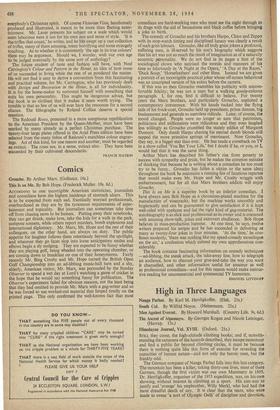Comics
Groucho. By Arthur Marx. (Gollancz. 16s.) This Is on Me. By Bob Hope. (Frederick Muller. 10s. 6d.) ACCORDING to one incorrigible American statistician, journalists and comedians have the highest incidence of stomach ulcers. This is to be expected from such sad, frantically worried professionals, overburdened as they are by the tyrannous requirements of enter- tainment and topicality. But journalists can sometimes take time off from chasing news to be human. Putting away their notebooks, they can get drunk, make love, take the kids for a walk in the park, compose sonnets, while others report murders, bomb explosions and international diplomacy. Mr. Marx, Mr. Hope and the rest of their colleagues, on the other hand, are always on duty. The public appetite for laughter follows them relentlessly beyond the spotlight, and wherever they go faces slop into loose anticipatory smiles and elbows begin a sly nudging. They are expected to be funny whether they are playing golf, being Wheeled into the operating chamber, or are coming down to breakfast on one of their honeymoons. Fairly recently Mr. Bing Crosby and Mr. Hope turned the British Open Golf Championship into an ad-libbing music-hall turn and a shy, elderly, American visitor, Mr. Marx, was persuaded by the Sunday Observer to spend a wet day at Lord's watching a game of cricket in the hope that he would say something funny for publication. The Observer's experiment failed for obvious reasons, not the least being that they had omitted to provide Mr. Marx with a gag-writer and so he was forced to use worked-out material that limped tiredly on the printed page. This only confirmed the well-known fact that most comedians are hard-working men who must see the night through to its dregs with the aid of benzedrene and black coffee before bringing a joke to birth.
The comedy of Groucho and his brothers Harpo, Chico and Zeppo with its stop-watch timing and disciplined lunacy was clearly a result of such grim labours. Groucho, like all truly great jokers a profound, suffering man, is ill-served by his son's biography which suggests that his art was not so much the result of imagination as of a naturally eccentric personality. We do not find in its pages a hint of the sociological clown who satirised the morals and manners of his time so hilariously in 'A Night at the Opera,' A Day at the Races,' `Duck Soup,' Horsefeathers' and other films. Instead we are given a portrait of an incorrigible practical joker whose off-screen behaviour was an unscripted version of his antics before the camera.
If this was so then Groucho resembles his publicity with uncom- fortable fidelity; he was not a man but a walking gossip-column paragraph. I, for one, find it difficult to believe. For twenty years the Marx brothers, and particularly Groucho, exploited a contemporary irreverence. With his hands tucked into the flying tails of his frock-coat, Groucho held up presidents, prima donnas, big businessmen and generals to merciless ridicule. Later, of course, the mood changed. People were no longer so sure that patriotism, politicians and millionaires were ridiculous and they even laughed less willingly as Groucho crumbled the stately edifice of Margaret Dumont. Only dumb Harpo chasing his eternal dumb blonde still tapped the more primitive springs of merriment. Now Groucho, they say, is a bigger star than ever. He has made a comeback on TV in a show called 'You Bet Your Life,' but I doubt if he, or you, or I, would feel that it was the same thing.
Arthur Marx has described his father's rise from poverty to ' success with sympathy and pride, but he makes the common mistake of thinking that because he is writing about a comedian he too must try to be funny. Groucho has fallen a victim to the same ideal throughout the book he maintains a running fire of facetious repartee that would make even Mr. Hope and Mr. Crosby wriggle with embarrassment, but for all that Marx brothers addicts will enjoy Groucho.
This Is on Me is a superior book by an inferior comedian. _ I have always seen Bob Hope as a chromium-plated machine for the manufacture of wisecracks, but the machine works smoothly and hygienically and can be guaranteed to give satisfaction if it is kept well-oiled with applause and fed the right kind of gag-material. The autobiography is as slick and professional as its owner and is crammed with amusing show-talk, jokes and extrovert ebullience. Bob Hope believes in mass-production humour. At one time, he says, twelve writers prepared his scripts and he has succeeded in delivering as many as twenty-four jokes in four minutes. 'At the time,' he con- fesses modestly, 'there was nothing like my speed-comedy monologue on the air,' a confession which calmed my own apprehensions con- siderably. The book contains fascinating information on comedy techniques —ad-libbing, the sneak attack, the take-away line, how to telegraph an audience, how to channel your give-and-take the way you want it channelled, and other information useful for amateur as well as professional comedians—and for this reason would make instruc- tive reading for uncommercial and commercial TV humorists.
EMANUEL LITVINOFF










































 Previous page
Previous page